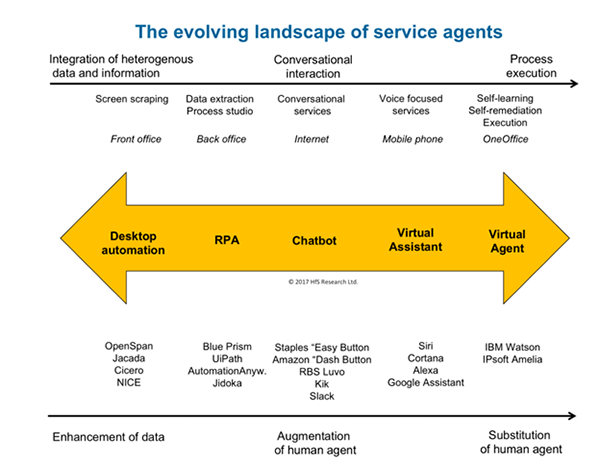In a world of inflated hype around chatbots and where customer service interactions solutions claiming to be AI or cognitive are popping up at a feverish pace, it’s up to service providers to take a stance and articulate a strong value proposition. Most pure play contact center service providers don’t have much of a strategy for Intelligent Automation in general and in AI in particular. Many are exploring partnership options or allocating tiny budgets to develop their own chatbots and lower level machine learning tools. CSS Corp has decided to flex some muscle and use its own IP to develop a virtual assistant, “Yodaa,” claiming to be an AI tool capable of “human-like” interaction. Combining NLP and machine learning, the SaaS-based solution can be used as a standalone support interface across contact center channels or as a platform integrated with Amazon Echo, Apple Siri, Microsoft Cortana and Google Now. It also has the ability to understand customer intent and learn from its interactions. CSS Corp is piloting Yodaa across 3 clients and 1 client has already gone live with the virtual assistant.
While the broader market gets excited about chatbots, the best way to discuss Yodaa’s capabilities is to look at the evolving landscape of service agents across a continuum (see graphic below) from more basic back office automation of processes all the way through to process execution on interactive channels. Without seeing specific use cases just yet, our best guess is that Yodaa falls somewhere on the spectrum between chatbots and virtual agents. It’s self-learning capabilities take it beyond the traditional bot to integrate with enterprise systems and learn from conversations, as well as combine both human and machine learning in what CSS Corp calls a “cotelligent” platform. Its multi-channel capabilities plus ability to integrate with existing consumer virtual assistants is another important feature. What remains to be seen is whether Yodaa’s capability extends to process execution the way that IBM’s Watson and IPSoft’s Amelia have demonstrated: to help front office professionals make better decisions with insightful, predictive data and analysis or routing customer requests to execution, or interact (in the case of Amelia) with some level of “emotional” intelligence.

Augmenting the agent experience: adding value to customer engagement
At the far right of the continuum, virtual agents are not only automating tasks to support the digitally-driven front office behind the scenes but also using cognitive intelligence to have meaningful, secure, and efficient interactions with customers. But, cutting through the hype, we’ve yet to see a virtual agent that really can replicate a true human interaction or execute processes the way a human can. IPSoft’s Amelia is the closest we’ve seen to be able to execute at a close to human capability.They’re getting more sophisticated, and ultimately these tools may replace some customer interactions, but not all. Ideally, virtual assistants and agents can help human agents do their jobs better to support the customer experience– by providing context and recommendations to agents, promoting more valuable interactions.This opens up the door for cross-selling and upsell opportunities, as well as promotes loyalty and satisfaction with customers, whereas lower level chatbots and automation simply replace repetitive tasks and automate basic functions without adding much value.
The Bottom Line: Virtual assistants have the potential to help transform the contact center if used correctly.
As Yodaa’s namesake famously said, “you must unlearn what you have learned.” Cognitive agents are not going to work well if they’re slapped on top of or inserted into broken and bad customer support processes. Customer service executives need to re-think and re-design the processes that contribute to customer experience across the board, which means “unlearning” bad habits, throwing away legacy thinking about “this is how we’ve always done it” to embrace making the contact center a much greater strategic entity within the enterprise– one which doesn’t continuously solve simple, repetitive issues (at great cost) but finds ways to build value. We explored this concept with CSS Corp in a POV last year, where we discussed the ways in which contact centers can transform from a cost center to a profit center—most notably, we looked at how enterprises can drive more revenue by analyzing their real-time customer interaction data and support contact flows. Virtual assistants like Yodaa contribute to this strategy by making data and context easily available and automated, becoming a valuable tool for marketing and sales as well, by learning from customer conversations to better understand their needs and expectations.
The lynchpin of success in the contact center for virtual assistants like Yodaa is the capability to fulfill a very important customer need for simplicity. It all boils down to making things easy for the customer while looking for opportunities to add value when appropriate.The Yodaa tool claims to understand customer intent and be able to learn from its conversations, which can provide a huge benefit to making customer service easier. CSS Corp’s Yodaa is onto something with its learning and integration capabilities, and looking forward we will see if customer stories pan out to show this is a capability which stands out amid the din that is the topic of service agents today.
In Q4 we will be exploring the world of service agents in more depth as we launch our first Cognitive Agents Emerging Market Guide.
Posted in : customer-experience-management, intelligent-automation






